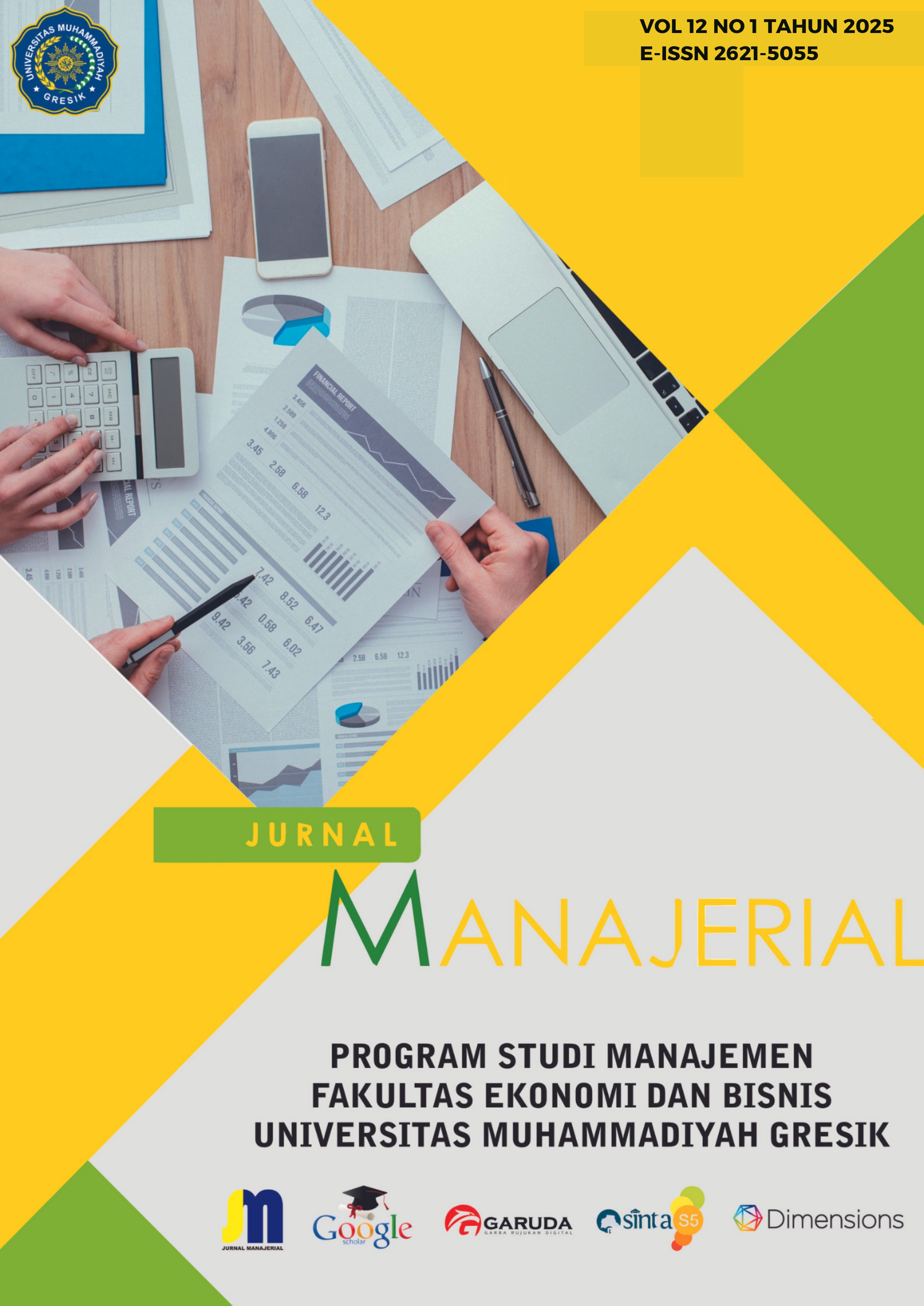Pengaruh Budaya Organisasi, Kompensasi, Dan Pengembangan Karir Terhadap Talent Retention Dengan Keterlibatan Pegawai Sebagai Variabel Intervening
DOI:
https://doi.org/10.30587/jurnalmanajerial.v12i01.9140Keywords:
Organizational Culture, Compensation, Career Development, Employee Involvement, Talent RetentionAbstract
Background – The mutation rate in the Civil Servant environment is still quite high, making it quite difficult to implement talent management. In the 2021 Civil Servant Candidate recruitment, 105 people were recorded as having resigned after being declared to have passed, this resignation was due to a mismatch in salary and placement location.
Aims – this study aims to test and determine the direct or indirect influence of organizational culture variables, compensation and career development on talent retention through employee engagement as an intervening variable.
Design/Methodology/Approach – This study uses a quantitative research method. Data were collected from 139 respondents who were selected using the random sampling method. The data analysis technique in this study used path analysis using the SEM (Structural Equation Modeling) model or Structural Equation Model with the WarpPLS 7.0 program.
Results and Discussion – the results of this study indicate that the variables of organizational culture, compensation and career development partially have a positive and significant effect on talent retention, and also have a positive and significant effect on employee engagement. Based on path analysis, there is a direct and indirect influence of the independent variable on the dependent variable through the intervening variable.
Conclusion - employee involvement in Jember district government activities will make employees more loyal and work optimally to achieve the goals of the district government. Improvement of organizational culture, and clarity of career development will increase talent retention, and supported by appropriate compensation.
Research implications - based on the results of this study, the Jember district government must foster values and norms in the organization to form a good organizational culture, evaluate and improve the career development system so that employees are more loyal and work optimally.
Research limitations - based on the results of the determination coefficient test, the contribution of the independent variables is only 61% and 68%, so it is necessary to add more independent variables so that the results are better. This study has not separated state civil servants from non-state civil servants.
References
Agustin, M., Mulyadi, Nerhoston, F., Andini, S., Nengsi, Y., & Sandika, Y. (2022). Pengaruh Organizational Culture, Competency, dan Knowledge Management Terhadap Kinerja Karyawan (Literature Review). ESCAF 1st 2022, 636–646.
Akther, N., Mamun, M. A. Al, Azad, M. A. K., & Sorwar, G. (2022). Review of Human Resource Management (HRM) Literature: A bibliometric Analysis (1981-2019). DLSU Business and Economics Review, 32(1), 176–190.
Al-Dalahmeh, M., Héder-Rima, M., & Dajnoki, K. (2020). The effect of talent management practices on employee turnover intention in the information and communication technologies (ICTs) sector: Case of Jordan. Problems and Perspectives in Management, 18(4), 59–71. https://doi.org/10.21511/ppm.18(4).2020.06
Alamgir, M., Ahmed, Z., & Ali, M. (2024). Impact of Training and Development, Corporate Entrepreneurship and Job Characteristic on Employee Retention through the Job attitude in Insurance Industry of Pakistan. Annals of Human and Social Sciences, 5(II). https://doi.org/10.35484/ahss.2024(5-ii)26
Aman-Ullah, A., Aziz, A., Ibrahim, H., Mehmood, W., & Aman-Ullah, A. (2023). The role of compensation in shaping employee’s behaviour: a mediation study through job satisfaction during the Covid-19 pandemic. Revista de Gestao, 30(2), 221–236. https://doi.org/10.1108/REGE-04-2021-0068
Angelina, N., & Fauzan, M. (2024). Pengaruh Loyalitas, Kompensasi dan Kepuasan Kerja Terhadap Keterlibatan Kerja Karyawan Tria Tenun Bali di Kota Denpasar Bali. Management Studies and Entrepreneurship Journal, 5(2), 3711–3718. https://journal.yrpipku.com/index.php/msej/article/view/4387%0Ahttps://journal.yrpipku.com/index.php/msej/article/download/4387/2542
Aryanti dan Herawati. (2021). STRATEGI MENINGKATKAN KETERLIBATAN KERJA KARYAWAN DENGAN PERSEPSI DUKUNGAN PERUSAHAAN DAN KOMPENSASI: KEPUASAN KERJA SEBAGAI INTERVENING PADA KARYAWAN DINAS TENAGA KERJA DAN TRANSMIGRASI DAERAH ISTIMEWA YOGYAKARTA (DIY). Jurnal Ilmiah MEA (Manajemen, Ekonomi, Dan Akuntansi), 5(1), 1–16.
Assegaf, D. A., & Wajdi, M. F. (2023). Pengaruh Budaya Organisasi Terhadap Kepuasan Kerja Yang Dimediasi Oleh Keterlibatan Kerja. University Research Colloqium, 37–46. http://repository.urecol.org/index.php/proceeding/article/download/2650/2608
Asyharul, M., Rika Mandasari, A., Zahratulafarhah, Septia Rani, D., Maysaroh, & Nur Afifah, Z. (2023). Faktor-Faktor Yang Mempengaruh Loyalitas Karyawan: Lingkungan Kerja Dan Kompensasi (Literature Review). Jurnal Ilmiah Manajemen Ekonomi Dan Akuntansi, 1(1), 166–173. http://jurnalistiqomah.org/index.php/jimea/article/view/134%0Ahttps://jurnalistiqomah.org/index.php/jimea/article/view/134/134
Azan, P. G., Hendriani, S., & Aulia, A. F. (2022). Pengaruh Manajemen Talenta Terhadap Retensi Karyawan melalui Keterikatan Karyawan Sebagai Variabel Mediasi di BPJS Kesehatan Kedeputian Wilayah Sumbagteng Jambi. Ando Fahda Aulia) Jurnal Daya Saing, 8(1).
Badan Pusat Statistik Kabupaten Jember. (2023). Kabupaten Jember dalam Angka 2023.
Baribin, D. P., & Abdul Rozaq. (2020). Pengaruh Kerja Tim Dan Pengembangan Karier Terhadap Pengembangan Diri Dan Keterlibatan Kerja Karyawan. Jurnal Manajemen Dan Keuangan, 8(3), 253–266. https://doi.org/10.33059/jmk.v8i3.1903
Boakye, K. G., Apenteng, B. A., Hanna, M. D., Kimsey, L., Mase, W. A., Opoku, S. T., Owens, C., & Peden, A. (2021). The impact of interpersonal support, supervisory support, and employee engagement on employee turnover intentions: Differences between financially distressed and highly financially distressed hospitals. Health Care Management Review, 46(2), 135–144. https://doi.org/10.1097/HMR.0000000000000251
Busch-Casler, J., Haubner, S., & Pinkwart, A. (2021). Employee involvement in innovation activities in hospitals: How perception matters. Health Services Management Research, 34(2), 70–79. https://doi.org/10.1177/0951484820943600
Chairunnisa, Aji, F., & Wijaya, A. N. (2023). Employee engagement: a literature review Keterlibatan karyawan: penelusuran literatur. Jurnal Pemikiran Dan Penelitian Psikologi, 18(2), 148–163.
Chopra, A., Sahoo, C. K., & Patel, G. (2024). Exploring the relationship between employer branding and talent retention: the mediation effect of employee engagement. International Journal of Organizational Analysis, 32(4), 702–720. https://doi.org/10.1108/IJOA-02-2023-3638
Claus, L. (2019). HR Distruption - time already to reinvent talent management. BRQ Business Research Quarterly, 22(3), 207–215.
Dahlia, M., & Fadli, R. (2022). Pengaruh Kompensasi Dan Motivasi Terhadap Kinerja Karyawan Pada Pt Fyc Megasolusi Di Tangerang Selatan. Jesya (Jurnal Ekonomi & Ekonomi Syariah), 5(1), 667–679. https://doi.org/10.36778/jesya.v5i1.623
De Gouverneur-General van Nederlandsch-Indie. (1928). Staatsblad van Nederlandsch-Indie No. 322 1928 Bestuurshervorming Decentralisatie Regentschappen Oost-Java. Aanwijzing van het Regentschap Djember als Zelfstandige Gemeenschap.
de Leon, M. V. (2020). Impact of managerial communication, managerial support, and organizational culture difference on turnover intention: A tale of two merged banks. Problems and Perspectives in Management, 18(4). https://doi.org/10.21511/ppm.18(4).2020.30
Diniawaty, S. A., & Prahirawan, W. (2024). Membangun Harmoni : Kajian Literatur tentang Keterkaitan Keterlibatan Kerja dan Work-Life Balance. Jurnal Ekonomi Manajemen Akuntansi, 9, 42–55.
Dwiputrianti, S., Sutiyono, W., Suryanto, A., Rachmawati, T., & Octoviandy Purba, C. (2023). Understanding Indicators of Talent Acquisition and Retention of Different Generations in Building Talent Management: A Case Study of DKI Jakarta Provincial Government. Policy & Governance Review, 7(1), 86. https://doi.org/10.30589/pgr.v7i1.646
Ekowati, S., & Arianto, T. (2022). Analisis Pengaruh Gaya Kepemimpinan dan Komitmen Organisasi terhadap Pengembangan Karir Karyawan pada PT. Agung Automall Cabang Bengkulu. Journal Ekombis Review, 10(1), 551–558. https://jurnal.unived.ac.id/index.php/er/article/view/1937%0Ahttps://jurnal.unived.ac.id/index.php/er/article/download/1937/1492
Faiz, D., Alim, J., & Rahmawati, S. (2023). Pengaruh Budaya Organisasi Terhadap Keterlibatan Karyawan Generasi Y Kantor Pusat Pt Pln Jakarta. JIMFE (Jurnal Ilmiah Manajemen Fakultas Ekonomi), 9(1), 1–14. https://doi.org/10.34203/jimfe.v9i1.6477
Farid, R., & Luvia, G. (2022). Faktor-Faktor yang Mempengaruhi Retensi Karyawan pada Karyawan Bank Perkreditan Rakyat (BPR) di Batam. Jurnal Mirai Management, 7(3), 21–29.
Farida, F. A. (2020). Pengaruh Pengembangan Karier Terhadap Organizational Citizenship Behavior Dengan Peran Mediasi Employee Engagement. Seminar Nasional Manajemen, Ekonomi Dan Akuntansi FEB UNP Kediri, 601–609.
Farooq, H., Janjua, U. I., Madni, T. M., Waheed, A., Zareei, M., & Alanazi, F. (2022). Identification and Analysis of Factors Influencing Turnover Intention of Pakistan IT Professionals: An Empirical Study. IEEE Access, 10, 64234–64256. https://doi.org/10.1109/ACCESS.2022.3181753
Fei, L. K., Isa, M. B. M., Sigdel, B., Senathirajah, A. R. B. S., Al-Ainati, S., Haque, R., & Devasia, S. N. (2024). Factors Affecting Talent Retention to Ensure Sustainable Growth in the Automation Industry in Penang Free Industrial Zone. Kurdish Studies, 12(1), 3122 – 3143. https://www.scopus.com/inward/record.uri?eid=2-s2.0-85185142823&doi=10.58262%2Fks.v12i1.226&partnerID=40&md5=8e5c9a219b7b6aa7e0e972eaf7a846ec
Frega, R. (2021). Employee Involvement and Workplace Democracy. Business Ethics Quarterly, 31(3), 360–385. https://doi.org/10.1017/beq.2020.30
Fulmer, I. S., & Li, J. (2022). Compensation , Benefits , and Total Rewards : A Bird ’ s-Eye ( Re ) View. 147–169.
Gallardo-Gallardo, Thunnissen, M., & Schullion, H. (2020). Talent Management: context matters. The International Journal of Human Resouce Management, 31(4), 457–473.
Hakim, L. N. (2024). Peran Budaya Organisasi sebagai Pemoderasi terhadap Motivasi dan Kepemimpinan Transformasional dalam Kinerja Karyawan : Tinjauan Literatur. Jurnal Gentiaras Manajemen Dan Akuntansi, 16(1), 96–110.
Hasibuan. (2019). Manajemen Sumber Daya Manusia. PT. Bumi Aksara.
Hassan, Z. (2022). Employee retention through effective human resource management practices in Maldives: Mediation effects of compensation and rewards system. Journal of ENTREPRENEURSHIP, MANAGEMENT and INNOVATION, 18(2), 137–173.
Hermawan, E. (2022). Determination of Employee Retention: Skills, Rewards and Relationship between Employees (Literature Review). Dinasti International Journal of Economics, Finance & Accounting, 2(6), 647–657. https://doi.org/10.38035/dijefa.v2i6.1366
Herzberg, F. (2003). One More Time: How Do You Motivate Employees? Harvard Business Review, 81(1). https://doi.org/10.1007/978-1-349-02701-9_2
Hngoi, C. L., Abdullah, N. A., Wan Sulaiman, W. S., & Zaiedy Nor, N. I. (2024). Examining job involvement and perceived organizational support toward organizational commitment: job insecurity as mediator. Frontiers in Psychology, 15(January). https://doi.org/10.3389/fpsyg.2024.1290122
Hokianto, H. F. (2023). Turnover Intention: Introduction, Types, Causes, and Measurements (A Review). AFEBI Management and Business Review, 8(2), 99–108.
Indrawan, B., Muhson, A., & Efendi, R. (2023). Work Discipline Influenced by Work Compensation. International Journal of Multicultural and Multireligious Understanding, 10(2), 329–334. https://doi.org/doi.org/10.18415
Ismail, I., Idris, M., & Asri, A. (2023). Pengaruh Penempatan, Pengembangan Karier Dan Motivasi Terhadap Kinerja Pegawai Pada Dinas Lingkungan Hidup Dan Kehutanan …. Cash Flow Jurnal Manajemen, 134–144. https://e-jurnal.nobel.ac.id/index.php/jcf/article/view/3644%0Ahttps://e-jurnal.nobel.ac.id/index.php/jcf/article/download/3644/1848
Johara, F., Yahya, S. B., & Tehseen, S. (2019). Employee Retention, Market Orientation, and Organizational Performance-an Empirical Study. International Academic Journal of Bussiness Management, 06(01), 314–325.
Kamaroellah, R. A. (2014). Pengantar Budaya Organisasi (Konsep, Strategi Implementasi dan Manfaat) (Edisi Pert). Pustaka Radja.
Kemen-PANRB RI. (2020). Peraturan Menteri Pendayagunaan Aparatur Negara dan Reformasi Birokrasi Nomor 3 Tahun 2020 tentang Manajemen Talenta Aparatur Sipil Negara. Kementerian Hukum Dan HAM.
Kyndt, E., Dochy, F., Michielsen, M., & Moeyaert, B. (2009). Employee retention: Organisational and personal perspectives. Vocations and Learning, 2(3), 195–215. https://doi.org/10.1007/s12186-009-9024-7
Lintang, R., & Simamora, B. H. (2023). Employee Retention Improvement of Pulp and Paper Companies in Indonesia. WSEAS Transactions on Business and Economics, 20, 1959–1970. https://doi.org/10.37394/23207.2023.20.171
Long, J., Ohlsen, S., Senek, M., Booth, A., Weich, S., & Wood, E. (2023). Realist synthesis of factors affecting retention of staff in UK adult mental health services. BMJ Open, 13(5), 1–12. https://doi.org/10.1136/bmjopen-2022-070953
Lutfiansyah, A. (2021). Pengaruh budaya organisasi, kepuasan kerja, kompetensi & komitmen organisasi terhadap Komitmen Organisasi pada Universitas Sunan Giri Surabaya. Jurnal Ekonomi Dan Bisnis, November 2017, 8557.
Luthans, F. (2011). Organizational Behavior: An Evidence-Based Approach (12th Edition). In McGraw-Hill Irwin. https://doi.org/10.5005/jp/books/10358_23
Maslow, A. H. (1943). A Theory of Human Motivation. Brooklyn College. https://doi.org/10.1007/978-3-030-36875-3_12
Mering, L., Tunjang, H., & Toendan, R. Y. (2023). Pengaruh Kompensasi dan Budaya Organisasi terhadap Kinerja dengan Retensi Karyawan sebagai Mediasi di PT. Hutan Sawit Lestari, Kotawaringin Timur, Kal-teng. Media Bina Ilmiah, 17(1978), 2151–2162.
Mheiri, S. Al, Jabeen, F., & Abdallah, S. (2021). Inhibitors of talent retention in uae public healthcare. International Journal of Business and Society, 22(1), 74–101. https://doi.org/10.33736/IJBS.3163.2021
Mirji, H., Bhavsar, D. N., & Kapoor, R. (2023). Impact of Organizational Culture on Employee Engagement and Effectiveness. American Journal of Economics and Business Management, 6(1), 1–10. https://www.researchgate.net/publication/367309332%0Ahttps://www.researchgate.net/publication/367309332%0Afile:///C:/Users/Hp/Downloads/1869-ArticleText-3371-3636-10-202301071.pdf
Mohamad Mazlan, M. R., & Jambulingam, M. (2023). Challenges of Talent Retention: A Review of Literature. Journal of Business and Management Review, 4(2), 078–091. https://doi.org/10.47153/jbmr42.6302023
Mohammed, A. I., Firmansyah, E., & Djudiyah. (2024). The Impact of Organizational Culture on Employee Engagement and Productivity in the Workplace. Literature Review. International Journal of Research Publication and Reviews, 5(1), 2019–2023. www.ijrpr.com
Muarifah, A. M., Prabowo, H., & Dharmaputra, M. F. (2024). … Pelatihan, Pengembangan Karir, Dan Work Life Balance Terhadap Retensi Karyawan Dengan Kepuasan Kerja Sebagai Variabel Intervening pada PT. Laksana Bus …. Innovative: Journal Of …, 4, 772–787. http://j-innovative.org/index.php/Innovative/article/view/12867
Muljani, N. (2002). Kompensasi Sebagai Motivator Untuk Meningkatkan Kinerja Karyawan. Jurnal Manajemen & Kewirausahaan Jurusan Ekonomi Manajemen, 4(2), 108–122. http://puslit.petra.ac.id/journals/management/
Murtiningsih, R. S. (2020). The Impact of Compensation, Training &Development, and Organizational Culture on Job Satisfaction and Employee Retention. Indonesian Management and Accounting Research, 19(1), 33–50. https://doi.org/10.25105/imar.v19i1.6969
Nata, F. S., & Sugiono, E. (2024). Pengaruh Kompensasi, Transformational Leadership dan Budaya Organisasi terhadap Employee Engagement dengan Dimediasi Organizational Citizen Behavior pada Rumah Sakit Hermina Serpong. Costing: Journal of Economic, Business and Accounting, 7(5).
Nurisman, H. (2019). Pengaruh Lingkungan kerja, Budaya Organisasi, Pengembangan Karyawan dan Kepuasan Kerja terhadap Retensi Karyawan Generasi Y di PT Pamapersada Nusantara. Jurnal STEI Ekonomi, 27(1), 26–37. https://doi.org/10.36406/jemi.v27i1.151
Nurmalitasari, S., & Andriyani. (2021). Pengaruh Pelatihan, Pengembangan Karir, Work Life Balance terhadap Retensi Karyawan dengan Kepuasan kerja sebagai Variabel Pemediasi (Studi Pada Karyawan Tetap PT. BPR Restu Artha Makmur Kota Semarang). Diponegoro Journal of Management, 10(3), 1–15. http://ejournal-s1.undip.ac.id/index.php/dbr
Nursaid, N., Sidik, Y., Qomariah, N., & Satoto, E. (2022). The Role of Motivation, Organizational Culture, Work Discipline in Improving the Performance of Employees of the Jember Regency Cooperative and Micro Business Service. https://doi.org/10.4108/eai.10-8-2022.2320768
Ohunakin, F., Adeniji, A. A., Ogunlusi, G., Igbadumhe, F., Salau, O. P., & Sodeinde, A. G. (2020). Talent retention strategies and employees’ behavioural outcomes: Empirical evidence from hospitality industry. Business: Theory and Practice, 21(1), 192–199. https://doi.org/10.3846/btp.2020.11061
Oullette, R. R., Goodman, A. C., Martinez-Pedrasa, F., Moses, J. O., Cromer, K., Zhao, X., Pierre, J., & Frazier, S. L. (2020). A Systematic Review of Organizational and Workforce Interventions to Improve the Culture and Climate of Youth-Service Settings. Administration and Policy in Mental Health and Mental Health Services Research, 47(5), 764–778. https://doi.org/10.1007/s10488-020-01037-y
Pemerintah Kabupaten Jember. (2024). Lambang Daerah Kabupaten Jember. https://www.jemberkab.go.id/selayang-pandang/lambang-daerah/
Peter, M., Kavitha, S. F., & Ramamoorthy, R. (2019). Employee retention management. International Journal of Recent Technology and Engineering, 8(2 Special Issue 8), 18–20. https://doi.org/10.35940/ijrte.B1305.0882S819
Ping, L. L., Hee, O. C., Kowang, T. O., & Wu, C. H. (2024). Factors influencing employee retention of academic home tutors in a private school. International Journal of Evaluation and Research in Education , 13(2), 869–875. https://doi.org/10.11591/ijere.v13i2.26998
Prajodi, G., & Amalya, W. R. (2024). Pengembangan Karir dan Kompensasi Terhadap Retensi Karyawan pada Generasi Z di Bandar Lampung. Jurnal Administrasi Bisnis, 14(2), 176–181.
Puspita, A. (2020). Pengaruh budaya organisasi, pengembangan karir, dan kompensasi terhadap employee engagement di PT. BANK X, Tbk. Indikator, 4(1), 353507.
Putra, H., Fajar Nur Iman, M., Simamora, B. H., Nusantara University, B., Raya Kb Jeruk No, J., Jeruk, K., Kb Jeruk, K., Jakarta Barat, K., & Khusus Ibukota Jakarta, D. (2023). Pengaruh Keterlibatan dan Kepuasan Kerja terhadap Turnover Karyawan di Perusahaan Minyak Sawit: A Systematic Literature Review. Journal on Education, 05(04), 15671–15680.
Rahmawati, D., Herlambang, T., & Sanosra, A. (2024). Employee Engagement and Behavior Impact on Performance with Work-life Balance Mediation. Jurnal Ilmu Manajemen, 7(2), 45–53.
Rasheed, M. I., Okumus, F., Weng, Q., Hameed, Z., & Nawaz, M. S. (2020). Career adaptability and employee turnover intentions: The role of perceived career opportunities and orientation to happiness in the hospitality industry. Journal of Hospitality and Tourism Management, 44(May), 98–107. https://doi.org/10.1016/j.jhtm.2020.05.006
Ringson, J. (2022). Leadership and Organisational Culture in Local Government Administration in South Africa. Journal of Public Administration and Development Alternatives, 7(3), 33–47.
Sabrina, R. (2021). Manajemen Sumber Daya Manusia. In Edisi Revisi Jakarta: Bumi Aksara (Issue JUNI).
Sahir, S. H. (2021). Metodologi Penelitian. In Penerbit KBM Indonesia.
Sari, E. D., Prayekti, P., & Kurniawan, I. S. (2022). Pengaruh kompensasi dan, kepuasan kerja terhadap keterlibatan kerja karyawan dengan variabel motivasi intrinsik sebagai variabel intervening. Inovasi, 18(1), 76–84. https://doi.org/10.30872/jinv.v18i1.10450
Sariwulan, T., Thamrin, S., Suyatni, M., Agung, I., Widiputera, F., Susanto, A. B., & Calvin Capnary, M. (2021). Impact of employee talent management. Academic Journal of Interdisciplinary Studies, 10(5), 184–200. https://doi.org/10.36941/ajis-2021-0133
Savov, R., Kozáková, J., & Tlučhoř, J. (2022). Talent Retention in Slovak Companies: Explorative Study. E a M: Ekonomie a Management, 25(1), 77–95. https://doi.org/10.15240/TUL/001/2022-1-005
Setyawan, J., Rusdianti, E., & Widhiastuti, H. (2021). Pengaruh Kepuasan, Kompensasi Dan Kerjasama Tim Terhadap Kinerja Karyawan Di Mediasi Keterlibatan Karyawan. Jurnal Riset Ekonomi Dan Bisnis, 14(2), 133. https://doi.org/10.26623/jreb.v14i2.4229
Simanjorang, F., Baressa, A., Rahman, M., Arif, M. ’, & Nataldo, M. (2023). Literature Review: Overtime dan Well Being Employee. Jurnal Sosial Dan Humaniora, 1(2), 299–306. https://doi.org/10.62017/arima
Sindurnata, G. K., Herachwati, N., & Mudzakir, M. F. (2024). Talent Retention: A Systematic Literature Review (SLR). Ilmiah MEA, 8(2), 25–41.
Škerháková, V., Korba, P., Harničárová, M., & Taha, V. A. (2022). Talent Retention: Analysis of the Antecedents of Talented Employees’ Intention to Stay in the Organizations. European Journal of Interdisciplinary Studies, 14(1–6), 56–67. https://doi.org/10.24818/ejis.2022.04
Soelistya, D., Setyaningrum, R. P., Aisyah, N., Sahir, S. H., & Purwati, T. (2020). Budaya Organisasi dalam Praktik. In Nizamia Learning Center (Vol. 5, Issue 3).
Srimulyani, V. A., & Hermanto, Y. B. (2022). Organizational culture as a mediator of credible leadership influence on work engagement: empirical studies in private hospitals in East Java, Indonesia. Humanities and Social Sciences Communications, 9(1). https://doi.org/10.1057/s41599-022-01289-z
Steiner, S., Cropley, M., Simonds, L., & Heron, R. (2020). Reasons for Staying with Your Employer: Identifying the Key Organizational Predictors of Employee Retention Within a Global Energy Business. Journal of Occupational and Environmental Medicine, 62(4), 289–295. https://doi.org/10.1097/JOM.0000000000001820
Sugiyono. (2013). Metode penelitian kuantitatif kualitatif dan R&D. In Penerbit Alfabeta. Penerbit Alfabeta.
Tamimi, M., Budi Eko Soetjipto, Sopiah, S., & Kurniawan, D. T. (2022). Budaya Organisasi dan Kinerja Karyawan. Husnayain Business Review, 2(2), 11–21. https://doi.org/10.54099/hbr.v2i2.100
Tejeda-Arias, L. A. (2023). Compensations and employee retention of an industrial company, Puente Piedra, 2022. Proceedings of the LACCEI International Multi-Conference for Engineering, Education and Technology, 1–7. https://doi.org/10.18687/LEIRD2023.1.1.128
Tentama, F., & Ermawati, U. (2021). Hubungan antara Pengembangan Karir dengan Employee Engagement pada Karyawan Relationship between Career Development and Employee Engagement. Jurnal Psikogenesis, 9(2), 196–204.
Tirta, A. H., & Enrika, A. (2020). Understanding the impact of reward and recognition, work life balance, on employee retention with job satisfaction as mediating variable on millennials in Indonesia. Journal of Business & Retail Management Research, 14(03), 88–99. https://doi.org/10.24052/jbrmr/v14is03/art-09
Tsai, P. H., Chen, C. J., & Tang, J. W. (2021). Key Factors Influencing Talent Retention and Turnover in Convenience Stores: A Comparison of Managers’ and Employees’ Perspectives. SAGE Open, 11(4). https://doi.org/10.1177/21582440211067240
Tsauri, S. (2013). MSDM - Manajemen Sumber Daya Manusia. In Journal of Modern African Studies (Vol. 35, Issue 17).
Tuna, S. N. H., Trang, I., & Soepeno, D. (2024). Pengaruh Pengembangan Karir,Keterlibatan Kerja Dan Persepsi Dukungan Organisasi Terhadap Retensi Karyawan Pada Pt.Bahana Security System Cabang Manado. Neraca Manajemen, 4(6), 1–18.
Undang-undang Nomor 12 Tahun 1950 tentang Pemerintahan Daerah Kabupaten di Djawa Timur. (1950).
Uribetxebarria, U., Garmendia, A., & Elorza, U. (2021). Does employee participation matter? An empirical study on the effects of participation on well-being and organizational performance. Central European Journal of Operations Research, 29(4), 1397–1425. https://doi.org/10.1007/s10100-020-00704-7
van Zyl, L. E., van Oort, A., Rispens, S., & Olckers, C. (2021). Work engagement and task performance within a global Dutch ICT-consulting firm: The mediating role of innovative work behaviors. Current Psychology, 40(8), 4012–4023. https://doi.org/10.1007/s12144-019-00339-1
Vieira, J., Gomes da Costa, C., & Santos, V. (2024). Talent Management and Generation Z: A Systematic Literature Review through the Lens of Employer Branding. Administrative Sciences, 14(3). https://doi.org/10.3390/admsci14030049
Wardoyo, B., Adil, A. S., & Hardiyono, H. (2023). Analisis Peluang Karier Pegawai Negeri Sipil di Kementerian Ketenagakerjaan akibat Perubahan Jabatan dari Struktural menjadi Fungsional. Accounting Profession Journal (APAJI), 5(2), 95–104.
Wibowo, E. A. (2022). CPNS yang mengundurkan diri ada 105 orang, terbanyak dari Kemenhub. Tempo.
Wijonarko, G., Muksin, N. N., & Rajiani, I. (2024). The loyalty imperative: Understanding the link between organizational culture and employee commitment. Journal of Infrastructure, Policy and Development, 8(4), 1–17. https://doi.org/10.24294/jipd.v8i4.3267
Yip, J. A., Levine, E. E., Brooks, A. W., & Schweitzer, M. E. (2020). Worry at work: How organizational culture promotes anxiety. Research in Organizational Behavior, 40(xxxx), 100124. https://doi.org/10.1016/j.riob.2020.100124
Zainal, N. S. B., Wider, W., Lajuma, S., Ahmad Khadri, M. W. A. B., Taib, N. M., & Joseph, A. (2022). Employee Retention in the Service Industry in Malaysia. Frontiers in Sociology, 7(July), 1–12. https://doi.org/10.3389/fsoc.2022.928951






























 P-ISSN: 2354-8592 __ E-ISSN: 2621-5055
P-ISSN: 2354-8592 __ E-ISSN: 2621-5055 
